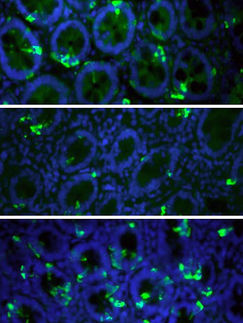Fat metabolizing hormone studied in humans
Advertisement
The endogenous substance FGF21 has beneficial effects on blood lipids and glucose levels in rodents and monkeys, and is an interesting candidate for treatment of type 2 diabetes. Scientists at Karolinska Institutet have now examined if FGF21 has a similar function in humans.
Disorders of fat and carbohydrate metabolism make a major contribution to common diseases such as diabetes, obesity, hyperlipidemia, and premature arthrosclerosis. In recent years, science has turned its attention to how endogenous substances circulating in the blood can affect metabolism, not least in relation to lifestyle, for example dietary, changes.
Fibroblast growth factor 21 (FGF21) is an endogenous substance that has recently been shown to reduce increased glucose levels in the blood in both rodents and monkeys. In mice, FGF21 seems to be closely associated with the metabolism of fatty acids and has been shown to increase dramatically after the ingestion of a high-fat diet and after a period of fasting, which is seen as a possible explanation for the positive effects of such dietary changes. FGF21 is therefore a very interesting candidate for the treatment of Type II (age-related) diabetes.
However, there has been no data to indicate whether FGF21 has any physiological importance in humans. Swedish scientists at Karolinska Institutet have now studied levels of circulating FGF21 in humans and how they can be affected by the ingestion of food, fasting and during therapy with lipid-reducing drugs.
"We've found evidence that FGF21 levels in the blood can be regulated in humans," says Professor Mats Rudling, who has led the study together with Professor Bo Angelin. "However, it seems as much more extreme circumstances are required, such as long-term fasting on the borderline to starvation."
The study, which was conducted at the Clinic for Endocrinology, Metabolism and Diabetes at Karolinska University Hospital in Huddinge, shows that FGF21 levels in blood are not affected by fasting for up to 48 hours or by treatment with a fat-rich 'ketogenic' diet (an extreme form of the Atkins Diet). The changes recorded are much more modest in scope than those observed in rodents. According to the researchers, this contradicts the idea that FGF21 is the hormone responsible for the positive effects ascribed to the Atkins Diet.
"The importance of making comparative studies between different species on metabolism and its regulation is obvious, and we now have to learn more about what treatment with this interesting hormone can lead to in humans," says Professor Rudling.
Original publication: Rudling et al., "The Circulating Metabolic Regulator FGF21 Is Induced by Prolonged Fasting and PPAR± Activation in Man"; Cell Metabolism 2008.





















































